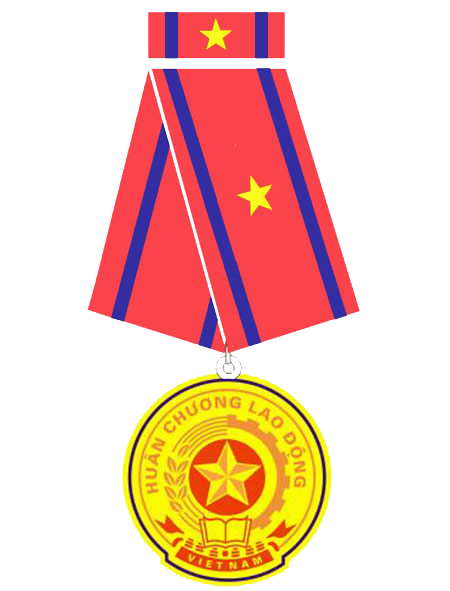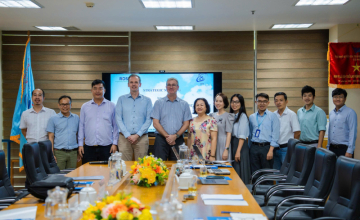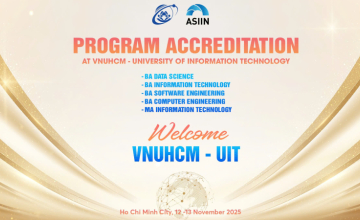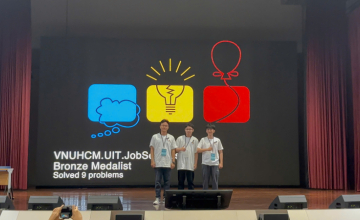Ho Minh Man, a graduate in Computer Science from the UIT Talent Program in 2017, continued his educational journey by enrolling in the Science and Engineering program at Hosei University in Japan. After his time in Japan, Man decided to move to the United States in search of more fitting opportunities for his career.
Let's hear about his fascinating journey:
Fascination with Japanese Culture
- Did you have any plans to study abroad or work in another country before?
Initially, I didn't have any plans to study abroad right after graduation. It was after working for a while in Computer Vision Engineering at EyeQ, that I met Mr. Tuan and Mr. Cat, two Ph.D. holders in Australia. They shared a lot of experiences and knowledge with me. At that point, I felt that my current knowledge was sufficient for my current tasks, but I lacked extensive research experience and in-depth knowledge in my field. That's when I decided to explore opportunities for studying abroad.
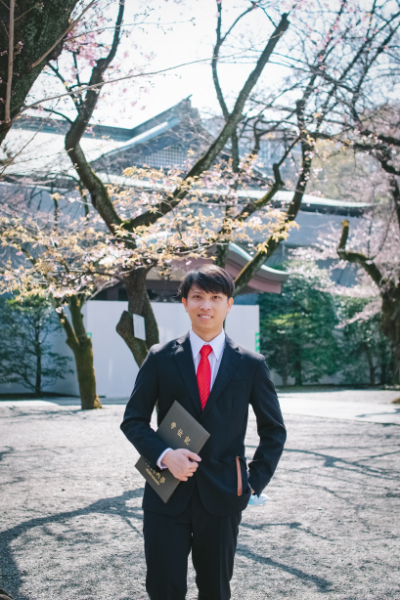
Minh Man graduated in Computer Science, UIT Talent Program in 2017
-How did the opportunity to study in Japan come about?
I have always dreamt of visiting Japan because I was fascinated by Japanese culture. Moreover, I had a friend who had previously studied at Hosei University. I sought advice from that friend and, after considering various factors like the facilities, the professors, the learning environment at Hosei, student employment opportunities, and financial aspects; I finally made the decision to study in Japan.

Minh Man chose Japan for studying abroad
- What challenges did you face while applying for scholarships?
Regarding finances, before enrolling, I had to discuss the scholarship and research funding I would receive with my professor. I also had to make sure that the funding would cover my two-year master's program, including tuition fees.
Additionally, international students in Japan have the opportunity to receive scholarships such as JASSO or Daddy Long Legs, specifically for Vietnamese students. The chances of getting these scholarships are quite high, and they are based on document evaluation rather than interviews, so I didn't encounter many difficulties in this regard.
When I applied for the visa, the process was relatively straightforward. I waited for the university's confirmation of acceptance and then submitted the Certificate of Eligibility (COE). Afterward, I went to the embassy to submit my documents and waited for the visa processing.
However, I faced language barriers while studying in Japan. In my opinion, language was the most significant obstacle to integration and personal development abroad.
New Opportunities in the US
- After studying in Japan, what opportunities helped you move to the United States for work?
Conducting research, publishing conference and journal papers during my master's and Ph.D. studies significantly aided my job search in the US. Additionally, I had to prepare thoroughly for various types of job interviews, including coding interviews and behavioral assessments. To explore job opportunities, I looked for opening jobs on LinkedIn. I sent my CV to positions and companies that matched my interests. This approach led me to my current job. I found the job aligning well with my research interests, so I applied and have been working there ever since.
 He is currently living and working in the US
He is currently living and working in the US
-Did it take you a long time to decide to move to the US?
It actually didn't take me long to decide to move to the US. After over three years of studying in Japan, I gradually realized that I wasn't well-suited for long-term development in Japan. It's not that Japan isn't good, but I felt that my working style didn't match the Japanese work culture. Moreover, due to my limited communication in Japanese, my career advancement opportunities were quite limited. After having the chance to converse and learn from some researchers in the US, I felt that I would have more opportunities for personal development there. The working culture also seemed to align better with my style, so I decided to move.

Minh Man quickly adapted to the life in the United States
-How different is the study and work environment in a foreign country compared to Vietnam?
Every country has its unique academic and work environment. The work environment in Japan differs from that in Vietnam, and the US work environment is distinct from Japan's. These environments are also influenced by culture. For example, feedback and criticism in the US are very direct. Sometimes, what they say for the first time might make newcomers feel quite down. However, in Japan, when they provide feedback about your work, they start by praising your work, then point out your mistakes between the praises. This approach makes me more comfortable to receive feedbacks but can also be confusing at times. Additionally, addressing others can be significantly different between countries.
-What advice do you have for students who are considering studying and working abroad?
I think one of my weaknesses, and the weakness of many international students, is the lack of information and long-term planning when deciding to study abroad. If individuals consider and research more before going abroad, they would have more opportunities and a better experience. For instance, each school has different training programs, and this information is usually available on the department's website. We can check if a program aligns with their interests before making a decision. Furthermore, in postgraduate studies, especially during a Ph.D., research plays a significant role. It's crucial to find out about the school’s professors and labs to determine if their research direction aligns with your interests and goals.
Financial planning is also crucial. Many schools have excellent programs and financial support for students, but this information isn't widely disseminated to students. Therefore, I advise students to explore as many opportunities as possible and choose the best one for themselves.
Source: Thu Hoai
Translation: Nhat Hien

